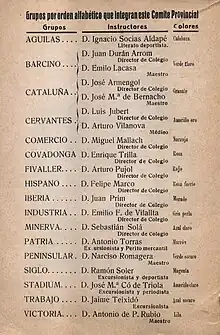Exploradores Barceloneses
The Exploradores Barceloneses was the first scouting initiative in Spain, the local version of Robert Baden-Powell's Boy Scouts founded in 1911[1] by cavalry captain Pedro Roselló Axet.[2] It was a pro-Spanish institution that was also in favor of decentralization.[3] This initiative was successful thanks to the collaboration of teachers from various private schools.[4]
| Exploradores Barceloneses (Barcelonan Boy Scouts) | |||
|---|---|---|---|
 Almacenes el Siglo Troop (1913). With Ramón Solé i Lluch as their instructor. | |||
| Country | Spain | ||
| Founded | 1911 | ||
| Defunct | 1940 | ||
| Founder | Pedro Roselló Axet | ||
|
| |||
History

Pedro Roselló was friend and colleague of Teodoro Iradier y Herrero - founder of the Exploradores de España together with Arturo Cuyás Armengol.[5] They got in touch with the French scouts during their stay in France and Teodoro Iradier gave Pedro Roselló (who was a cavalry captain in the Numáncia Regiment) the idea of creating a troop of boy scouts.[6]
However, it was Ramón Soler i Lluch (a hiker and worker of La Seda) who started the first boy scouts group in 1911. With several groups in operation, the provincial boy-scouts committee was officially constituted on November 5, 1912. They sent a cordial greeting to the Exploradores de España just after its creation,[7] and got integrated into the association the following year.[5]
The first gathering was held on January 19, 1913, at the Palau de les Belles Arts. The first solemn Promise happened that day, as well as the first parade through the streets of Barcelona.[8]
In less than three years the success had been notable, with the following active troops:[9]
- Águilas
- Barcino
- Cataluña
- Cervantes
- Comercio
- Covadonga
- Fivaller
- Hispano
- Iberia
- Industria
- Marco Polo
- Minerva
- Patria
- Peninsular
- Siglo
- Stadium
- Trabajo
- Victoria
Three groups were located in Sant Feliu de Llobregat, Tarragona, and Manresa.In 1914, the total census was 1,064 scouts, 48 instructors, a committee of 12 members, and 240 protective members.[9]
References
- Quintana Cabanas, María (1991). Iniciativas sociales en educación informal [Social initiatives in informal education] (in Spanish). Madrid: Ediciones Rialp. p. 143. ISBN 978-84-321-2700-7. LCCN 93106040. OCLC 29317144. OL 1452964M.
- Termes, Josep (2000). Història del catalanisme fins el 1923 [History of Catalanism until 1923] (in Catalan). Barcelona: Editorial Pòrtic. p. 697. ISBN 978-84-7306-601-3. LCCN 2001384211. OCLC 47270860. OL 20671110M.
- Full Informatiu de la Societat Catalana D'Historia de L'Educacio Dels Paisos de Llengua Catalana. Vol. No. 5–6, May 1986/December 1987. Institute for Catalan Studies. p. 45.
- Ferret, Antoni [in Catalan] (1968). Compendi d'historia de Catalunya (segle xx) [Summary of the history of Catalonia (20th century)] (in Catalan). Editorial Bruguera. p. 42.
- Vallès, Edmon (1975). Història gràfica de la Catalunya contemporània, 1888/1931: De solidaritat catalana a la mancomunitat, 1908–1916 (in Catalan). Edicions 62. p. 294. ISBN 978-84-297-1025-0. LCCN 75557812. OCLC 496667120. OL 4824150M.
- Antoni Serra i Garcia (1968). Història de l'escoltisme català (in Spanish). Editorial Bruguera. p. 12.
- "Constitución Comité Provincial de Boy-Scouts de Barcelona" (in Spanish). La Vanguardia. 1912-11-07. p. 4. Retrieved 2019-01-04.
- Maria de Borja i Solé (1984). El juego como actividad educativa: instruir deleitando (in Spanish). Barcelona: Edicions Universitat Barcelona. p. 89. ISBN 978-84-7528-111-7. OCLC 21061729. OL 47390740M.
- Els Fons de l'escoltisme català de l'Arxiu Nacional de Catalunya (PDF) (in Catalan). Barcelona: National Archive of Catalonia. 2014. p. 12. Archived from the original (PDF) on 2016-03-04. Retrieved 2015-10-23.
Bibliography
External links
- Federation of Scouting in Spain at the Wayback Machine (archived 2013-10-29)
- Scouts de España (in Spanish)